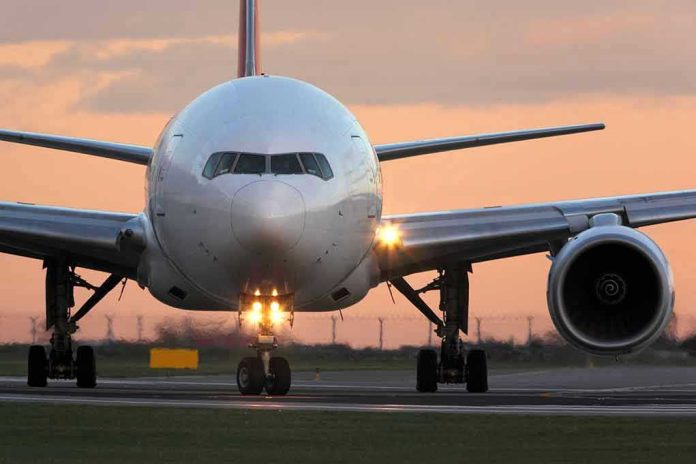
Newark Liberty International Airport halts flights, leaving travelers stranded due to a government shutdown staffing crisis.
Story Highlights
- Newark Airport stops flights for over seven hours due to controller shortages.
- Federal shutdown leaves essential workers unpaid, escalating absenteeism.
- Delays and cancellations spread nationwide, affecting thousands.
- Long-standing policy issues in air traffic control resurface amid crisis.
Newark’s Unprecedented Flight Halt
On October 26, 2025, Newark Liberty International Airport faced an unprecedented halt in operations, with flights suspended from 3:32 p.m. to 10:59 p.m. Eastern Time. This drastic measure was due to a severe shortage of air traffic controllers, directly linked to the ongoing federal government shutdown. Essential workers, such as air traffic controllers, were working without pay, leading to increased sick leave and absenteeism, which paralyzed one of the nation’s busiest airports.
The airport shutdown at Newark caused widespread delays and cancellations, impacting hundreds of flights and thousands of passengers. This event underscored the acute vulnerability of critical infrastructure, such as air travel, to federal shutdowns. Newark was notably the first major US airport to halt flights entirely due to a staffing crisis, marking an unprecedented scale and duration in recent US aviation history.
Historical Context of Understaffing
The current crisis is rooted in historical understaffing issues within the US air traffic control system, dating back to the 1981 PATCO strike. After the strike, thousands of controllers were fired, leading to a long-term workforce deficit. Despite a significant increase in daily flights over the decades, the number of certified controllers has decreased by 38%. Recent policy decisions, such as the transfer of Newark’s airspace control to Philadelphia in 2024 and mass layoffs by the Department of Government Efficiency, have further strained the system.
Newark Liberty International plays a critical role in national and international travel, and the impact of the shutdown was magnified due to the airport’s importance. The ongoing shutdown, which began in October 2025, suspended pay for “essential” workers, including air traffic controllers, thereby exacerbating an already precarious situation.
Implications and Industry Response
The short-term implications of this shutdown include severe travel disruptions, economic losses for airlines and passengers, and increased safety risks due to overworked controllers. In the long term, this crisis could erode public trust in the reliability of air travel, potentially leading to further workforce attrition and increased pressure for systemic reform. The aviation industry now faces renewed scrutiny over staffing, safety, and infrastructure investment.
Passengers, airlines, air traffic controllers, and local economies have all been significantly affected. The financial losses, reputational damage, increased stress, financial hardship, and burnout among controllers are pressing issues. This situation has intensified the debate over government shutdowns and essential worker protections, highlighting the need for regulatory or legislative changes to safeguard essential transportation services.
Sources:
Severe delays at Newark airport highlight the ongoing crisis of air traffic controller staffing
Newark Paralyzed: Flights Stopped Due to Staff Shortages During the Shutdown














